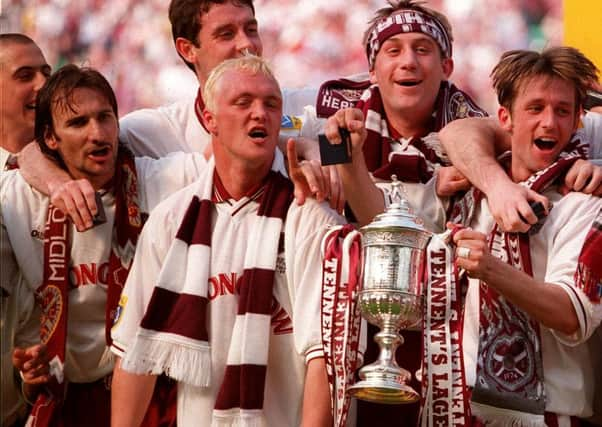How Stefano Salvatori helped Hearts end their 36-year trophy drought


Salvatori is a Hearts legend - and, in the minds of those who watched him play, his most treasured moment in maroon and white came at Celtic Park 19 years ago.
If you’re hazy on the details, let me quickly fill you in. Signed on a free transfer in 1996, Salvatori would be part of Hearts’ 1998 Scottish Cup triumph. For an entire generation of fans, maybe even two generations, this was the greatest moment they experienced watching the club. Thirty-six years of hurt were finally wiped out with a 2-1 victory over Rangers. Two further cups have been added since then, but nothing will beat the elation of when Willie Young sounded his whistle and thousands of Hearts fans could blissfully, and emotionally, rejoice in a moment they doubted would ever come.
Advertisement
Hide AdAdvertisement
Hide AdIn honour of the graceful Italian with the flowing locks, I decided to look back at his performance in that famous match and analyse his contribution to such an important moment in Hearts’ history.
A defensive midfielder with atypical quickness for the position, he was both an athletically and technically sound player. He could put in a shift, run with the ball, and spot a pass. Although, it’s fair to say neither of the two latter qualities were what defined his performance that day.
While I didn’t count them one by one, I’d be surprised to if he attempted more than 15 passes that day. For a player sitting at the base of the midfield, that’s pretty low.
In fairness, the same could be said of numerous members of the Hearts team. Manager Jim Jefferies and assistant Billy Brown have always said they came with a gameplan: to sit deep, soak up pressure and try to counter attack. They certainly did that. For long periods Hearts were penned in their own half. What we cannot tell is whether this was the exact gameplan before kick-off, or whether it was turned up to 11 once the underdogs went in front thanks to a second minute penalty.
Salvatori, like several of his team-mates, hadn’t even touched the ball before Hearts were 1-0 up. He did, however, offer himself for a pass before Steve Fulton set out on his defence-splitting run which won the spot-kick. If you’re being generous, and in light of the recent tragedy we have every right to be, you could say Salvatori’s eagerness to get involved caused Rangers’ Ian Ferguson to shift one step further to his left, thereby inadvertently showing Fulton the yard of space which he so eagerly attacked.
Watching the footage, it didn’t take long to define Salvatori’s task. He was to follow his countryman, Rino Gattuso. Similar to the elder statesman whom he faced that day, Gattuso would make a career for himself in the top flight of Italy playing at the base of the midfield. At Rangers, though, he was often asked to contribute more in an attacking sense, and that was the case in he final. In particular, when Brian Laudrup drifted inside from his free role starting on the left, Gattuso was to attack the space on the right of the Hearts defence. Every time he did so, he found Salvatori matching his every move.
It was an intriguing battle between the pair. The older Italian was disciplined in his pursuit of his younger opponent, but Gattuso won a few individual battles. Overall, though, the decision on points would have gone to the Hearts player. He was even victim to a couple of fouls from the agitated 20-year-old, who on another day could so easily have received his marching orders after committing a further two fouls after finally being booked.
Hearts would score their second goal on 53 minutes, but the moment might never have arrived. Three minutes beforehand, they survived two scares in the space of a few seconds, both involving Salvatori. Tracking Gattuso as the combative midfielder ran toward goal, the Hearts man slid in and knocked the ball forward. Unfortunately, Gary Naysmith, instead of staying on his heels, had gone for the tackle too. The two men collided with each other, as the ball spun perfectly into the path of the still running Gattuso. When his cut-back was miscontrolled by substitute Ally McCoist, Paul Ritchie went to boot away the danger. Again, though, fate seemed to be briefly conspiring against our hero, as the ball caught Salvatori on the leg just as he was getting to his feet, dropping back into McCoist’s path. The striker’s attempt on goal deflected off Ritchie and the chance was gone.
Advertisement
Hide AdAdvertisement
Hide AdA short time later Stephane Adam scored the second and, for a period, Hearts seemed to be on cruise control, but as the game entered its final stages things began to get very nervy as Rangers pulled a goal back. Considering the discipline with which they defended throughout the match, McCoist’s goal, which gave Rangers real hope of retrieving the match, was fairly soft from a Hearts point of view. Salvatori had strode forward to head the ball, but when nobody dropped into his space to cover the defence, Rangers were able to pass it through for the veteran striker to finish past Gilles Rousset.
The remaining nine minutes - plus four minutes of stoppage time - were like the Alamo. Defenders were throwing themselves in front of everything in the desperate hope of hanging on.
Anyone who saw that match will remember McCoist splitting the Hearts centre-backs again, only to be tripped by David Weir. It initially appeared as though a penalty had been given - and, if we’re being honest, it should have been - but instead the referee was pointing to the edge of the box. What few will remember is that Brian Laudrup’s clipped free-kick was in danger of sneaking through the gap in the Hearts wall. The man the ball hit off and deflected wide? Stefano Salvatori.